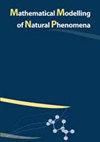Nitric oxide transport in carotid bifurcation after different stent interventions: a numerical study
IF 2.1
4区 数学
Q2 MATHEMATICAL & COMPUTATIONAL BIOLOGY
引用次数: 0
Abstract
Stent restenosis and late thrombosis compromise endovascular stent implantation clinical benefit, and the mechanism is unclear. Since nitric oxide (NO) plays a pivotal role in maintaining vascular homeostasis, we believe that stenting can affect NO concentration in the host artery, thereby contributing to postoperative adverse events. We numerically investigated NO concentration after stenting based on the patient-specific carotid to verify this hypothesis. The simulation revealed that stent implantation caused blood flow disturbance, a low wall shear stress, and a significant decrease in NO on the luminal surface, especially in the region of the stented segment. Moreover, severe damage to the artery wall or low blood flow, leading to a low NO generation rate, would induce relatively low NO level in the stented segment. Additionally, we demonstrated that NO distribution might be affected by the combination of stent struts and carotid bifurcation geometry, while the host arterial configuration might play a leading role in the distribution of NO concentration. In conclusion, the carotid artery had a relatively low NO concentration level near stent struts, especially at the severely injured artery, low blood flow, long stenting, and complex host artery which might lead to a genesis/development of adverse events after that intervention.不同支架介入后颈动脉分叉处的一氧化氮运输:一项数值研究
支架再狭窄和晚期血栓形成损害了血管内支架植入术的临床疗效,其机制尚不清楚。由于一氧化氮(NO)在维持血管稳态中起着关键作用,我们认为支架植入术会影响宿主动脉中的一氧化氮浓度,从而导致术后不良事件的发生。为了验证这一假设,我们基于患者特异性颈动脉对支架植入后的 NO 浓度进行了数值研究。模拟结果显示,支架植入导致血流紊乱、管壁剪应力降低,管腔表面的 NO 显著减少,尤其是在支架段区域。此外,动脉壁的严重破坏或低血流量导致 NO 生成率低,也会引起支架区段的 NO 水平相对较低。此外,我们还证明,NO 的分布可能会受到支架支柱和颈动脉分叉几何形状组合的影响,而宿主动脉的构造可能会在 NO 浓度的分布中起主导作用。总之,颈动脉支架支柱附近的 NO 浓度水平相对较低,尤其是在严重损伤的动脉、低血流量、长支架和复杂的宿主动脉处,这可能会导致介入治疗后不良事件的发生/发展。
本文章由计算机程序翻译,如有差异,请以英文原文为准。
求助全文
约1分钟内获得全文
求助全文
来源期刊

Mathematical Modelling of Natural Phenomena
MATHEMATICAL & COMPUTATIONAL BIOLOGY-MATHEMATICS, INTERDISCIPLINARY APPLICATIONS
CiteScore
5.20
自引率
0.00%
发文量
46
审稿时长
6-12 weeks
期刊介绍:
The Mathematical Modelling of Natural Phenomena (MMNP) is an international research journal, which publishes top-level original and review papers, short communications and proceedings on mathematical modelling in biology, medicine, chemistry, physics, and other areas. The scope of the journal is devoted to mathematical modelling with sufficiently advanced model, and the works studying mainly the existence and stability of stationary points of ODE systems are not considered. The scope of the journal also includes applied mathematics and mathematical analysis in the context of its applications to the real world problems. The journal is essentially functioning on the basis of topical issues representing active areas of research. Each topical issue has its own editorial board. The authors are invited to submit papers to the announced issues or to suggest new issues.
Journal publishes research articles and reviews within the whole field of mathematical modelling, and it will continue to provide information on the latest trends and developments in this ever-expanding subject.
 求助内容:
求助内容: 应助结果提醒方式:
应助结果提醒方式:


